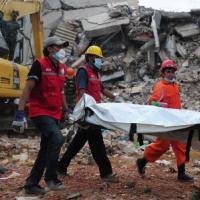
It is said that where labour is cheap, life is cheap. This is never more so than in the recent horrific deaths of over 400 garment workers crushed in a collapsed building in Dhaka, the capital of Bangladesh.
Hundreds are still missing and a further 1,000 workers were injured.
The disaster led to spontaneous protests by thousands of low-paid garment factory workers throughout the city who demanded justice for the dead and injured. Police attacked demonstrators using tear gas and rubber bullets.
The opposition Bangladesh Nationalist Party (BNP), a capitalist Islamist party, has opportunistically called for a national strike on 2 May. When in power previously it did nothing to advance workers’ rights.
According to media reports, the day before the disaster inspection teams had found huge cracks in the building’s structure.
But while shops and a bank on the lower floor immediately closed the owners of the garment factory above told employees to continue working, despite the obvious safety risks.
Exploitation
There are an estimated 5,000 factories in Bangladesh paying around 3.2 million workers as little as £24 a month to make clothes for western-based companies such as Primark, Matalan, Wal-Mart, Benetton, etc.
This is not the first time such a catastrophe has happened at a garment factory in the area. A similar collapse occurred in 2005. And only last November, a fire at another garment factory in Dhaka left 112 dead.
Despite repeated assurances from brand importers and local authorities that they would ensure the safety of workers and eradicate substandard buildings, it’s clear from this latest disaster that nothing has changed.
The building’s owner, arrested along with six others, is reportedly well connected to the ruling Awami League and the BNP.
It is clear that the bosses both globally and locally will not protect workers when there are vast profits to be made; neither will the Bangladesh government as the garment industry accounts for 80% of the country’s export earnings.
Trade unions should pressure clothing companies into binding agreements on health and safety for workers in ex-colonial countries.
Only strong union organisation can fight to improve workplace health and safety and drive up wages to acceptable levels.
The building of effective trade unions won’t, however, be easily achieved. Last year trade union activist Aminul Islam was murdered and the police have not solved the case.

Be the first to comment